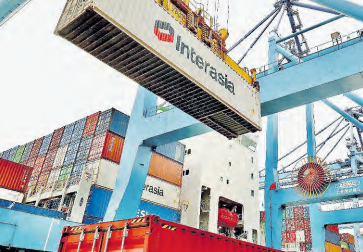

The planned increase of port charges at key facilities in Kenya has rattled traders and shippers with concerns that the move will hit businesses and consumers.
This comes as Kenya Ports Authority moves to regional markets for stakeholder engagements with a meeting in Kampala yesterday before moving to Rwanda tomorrow, after meeting port stakeholders in Mombasa and Nairobi.
KPA wants to increase tariffs on at least 25 services offered at the Port of Mombasa, Lamu, and Inland Container Depots among other facilities, which will push up some charges fivefold.
This is on the advice of consultancy firm–Maritime Business and Economic Consultants, owned by former KPA top managers that bagged a Sh14.8 million contract to guide the review of service charges by the state corporation.
The tariffs include pilotage fees, tug services, mooring services, light dues, port and harbour dues, dockage, buoyage and anchorage, supply of fresh water, salvage and towing operations, stevedoring container handling charges, storage charges and penalties.
They also cover port access charges and ferry services, among others. For instance, vessels other than those exempted, or paying an annual fee are subject to a minimum charge of $200 (Sh25,850) per call up from $150 (Sh19,387), in addition to other service charges.
Vessels that are resident in a Kenyan Port shall pay an annual fee, to be charged at $1,000 (Sh129,250 ) payable annually in advance, up from $600 (Sh77,550).
Dry general cargo discharging, loading, shifting on board without landing shall cost $8.50 (Sh1,098) per tonne up from $7.50 (Sh 969).
Costs for discharging motor vehicles, petroleum products, containarised goods have also gone up by up to 30 per cent, the proposed tariff review seen by the Star shows.
Containers remaining in the authority’s terminals at the Port of Mombasa and at the ICDs in excess of free periods (four days for domestic and 15 days for transit) shall accrue storage charges of $30 for a 20-foot container and $60 for a 40-foot container within the fifth and tenth day.
Thereafter, domestic cargo will attract a penalty of $55 up from $45 for a 20-foot container and $105 up from $90 for a 40-foot container.
Transit containers will attract charges of $30 and $60 between day 16 and 21, and thereafter attract charges of between $55 and $105.
Cost for port passes has also increased by up to six times deepening on the mode of transport with lorries being among the highest charged.
According to the consulting firm, the tariffs were derived at after a comprehensive analysis.
“They considered cost of providing service such as fuel, labour, equipment maintenance as well as inflation, return of investment etc,” the firm’s managing partner Omae Nyarandi told the Star, “But more important, there was comparison of the regional ports like Dar and Djibouti.”
“What has been produced are Tariff draft proposals. After stakeholder engagements are completed, the consultant will incorporate the same and advice the client. Definitely, the input of the stakeholders is critical in refocusing on regional competition.”
Port users led by the Shippers Council of Eastern Africa (SCEA) have however opposed the proposed tariff increases and have urged KPA to reconsider the timing and the proposals, which they say will have “serious costs implications on businesses”.
The move, SCEA said, will affect imports, exports, bulk cargo and petroleum products, competitiveness and attractiveness of Mombasa Port.
“Our preliminary calculations and analysis indicate that costs per container will increase by between 20 per cent and and 27 per cent,” SCEA chief executive Agayo Ogambi said.
While in the recent past sea freight is gaining traction, the proposed tariffs review will hurt exports through the Port of Mombasa, he added.
The proposed increase in handling charges, plug in costs will further complicate exports of perishables and which are hurting from increased freight costs and delays occasioned by the Red Sea crisis, Ogambi further noted.
“While it is true, KPA has not reviewed the tariffs since 2012, the fact that KPA charges are denominated in USD, this has cushioned the authority from currency functions. In 2012, the exchange rate was Sh85 to 1 USD. Today, it is at Sh129,” he said.
SCEA said the tariff review must address the challenges and especially those posed by transhipment and which can be handled at Lamu.
It has also called on KPA to consider the tough business environment that has a number of companies close down.
“Unfortunately, all the costs
will be borne by shippers, and ultimately, the consumers. The proposed
review, if implemented as presented,
will have serious financial challenges
affecting all spheres of the economy,”
said Ogambi.








